Transportation
Lawmakers Just Stole Air Travelers’ Right To Midflight Water
Congressional lawmakers quietly removed language from an aviation bill that would have guaranteed airplane passengers the right to drinking water on flights, according to legislative text reviewed by The Lever.
Lawmakers are also rejecting demands to set minimum seat dimensions, even as airplane seat sizes have shrunk several inches over the past four decades.
The decisions reflected in legislation governing the Federal Aviation Administration (FAA) follow airlines spending nearly $5 million lobbying Congress in the first four months of the year, according to lobbying disclosures reviewed by The Lever.
In July 2023, the House of Representatives advanced an initial version of bipartisan FAA legislation requiring airlines to provide drinking water to passengers on flights longer than an hour — a basic human need that airlines currently do not legally have to fulfill, even on hours-long flights.
However, the drinking water requirement was stripped from the final version of the legislation released this week by Sen. Maria Cantwell (D-Wash.), Sen. Ted Cruz (D-Texas), Rep. Sam Graves (R-Mo.) and Rep. Rick Larsen (D-Wash.), who lead their chambers’ transportation oversight committees.
If their bill passes without changes, airline passengers will continue to have no legal right to drinking water on flights, The FAA bill, which provides funding and sets policy guidelines for the FAA for the next five years, may also make it more difficult for passengers to receive refunds for canceled or delayed flights and sidesteps setting minimum standards for seat dimensions — a topic that has irked passengers for decades.
While some airlines voluntarily offer water, many budget airlines do not, and instead charge passengers who ask for it.
“Airlines want to have the freedom to increase charges of any kind without limitation,” said Paul Hudson, president of FlyersRights, an airline passenger advocacy group. Hudson added that this lobbying approach has led to the lack of water-access standards.
“There are very few specific requirements that are imposed on airlines when it comes to customer service,” he said.
Rep. Shontel Brown (D-Ohio) introduced the drinking water provision into the House version of the FAA reauthorization deal last summer. In a statement after the legislation passed the House in July 2023, Brown said the amendment would ensure “that passengers remain healthy and hydrated on flights.”
Brown’s office did not return a request for comment from The Lever about the policy’s exclusion from the final deal.
Negotiations over the FAA deal dragged on far past its original September 2023 finalization deadline, and lawmakers leading the negotiations announced a final deal on Monday. The legislation still must pass both chambers of Congress, but lawmakers said it has bipartisan support, making significant revisions unlikely.
Although consumer rights advocates have praised some aspects of the bill — like a provision prohibiting airlines from charging fees to seat parents together with their young children — it also handed key wins to the airline industry.
The final deal, for instance, was released just days after the Department of Transportation released a new rule that would force airlines to provide automatic refunds to passengers when their flights are canceled, bypassing the often arduous process currently in place to get refunds. News of the policy brought the Biden Administration praise and drew joyous headlines.
But as The Lever reported on Monday, the FAA deal contained a provision that appeared to reject the automatic refund guarantee. A section tucked hundreds of pages into the legislation noted that consumers were owed a refund if their flight was canceled or significantly delayed — but that they had to provide the airline written or electronic notice to get one, essentially putting the onus back on the consumer.
The language was potentially a win for the airline industry, which strongly opposed the new automatic refund rules from the Transportation Department when they were announced. Trade groups for the airlines are already citing the language in the bill to argue that the automatic refund rule should be overturned.

Learn All Our Investigative Tricks
Score a copy of our Citizens’ Guide to Following the Money and Holding the Powerful Accountable, free with a paid subscription. The e-book gives you all the tools and tricks our reporting team uses to scrutinize power.
The absence of any standard around drinking water is another win for the industry. Currently, airlines are only required to provide passengers with water when there is a tarmac delay of more than two hours, but not on a cross-country flight, contrary to recommendations by the Aerospace Medical Association, which suggests passengers “drink about 8 ounces of water each hour.”
The reauthorization bill was a key focus for airline lobbying efforts in Washington. Airlines for America — a trade association representing Alaska Airlines, American Airlines, Delta, Southwest, and other top airlines in the country — paid five different lobbying firms to sway lawmakers on the reauthorization bill, and other topics, federal disclosures show.
So far this year, Airlines for America spent more than $1.4 million lobbying Congress, the Transportation Department, the FAA, and other regulators on the FAA Reauthorization bill, among other topics.
Dozens of individual airlines — including Delta, United, and JetBlue — also lobbied this year on the legislation and other matters.
“A Long Saga Of Resistance”
Congress also balked at establishing guidelines for minimum airplane seat dimensions in the current legislation, an irksome topic for many passengers as seats have slowly shrunk over the past few decades. Today, seats on the top domestic airlines — American, Delta, Southwest, and United — have cut passengers’ legroom by roughly two to five inches and reduced seat widths by two inches since the 1980s.
In the last FAA reauthorization bill in 2018, Congress directed the FAA to establish rules on minimum seat dimensions “that are necessary for passenger safety.” The agency issued a request for comment on a proposed rule on the subject in 2022, but a final rule has yet to be established.
Cure SMA, an advocacy organization for people with spinal muscular atrophy, lobbied on seat dimensions and other issues in 2022. In a comment letter to the FAA, the group urged the agency to consider establishing larger seat dimensions.
“Larger seat dimensions and seat pitch on aircrafts would make it safer for individuals with [spinal muscular atrophy] and the passengers around them to evacuate in an emergency,” the group wrote. “The small seat pitch creates a bottleneck during the regular deplaning process and could be very problematic in an emergency, when every second matters. This can also be uncomfortable for the passenger with a disability and the other passengers in the row.”
The group also said that the FAA and airlines need to more thoroughly consider the needs of passengers with wheelchairs.
But airline groups have lobbied against any attempt to improve standards for airplane seats. Airlines for America has spent more than $7.2 million lobbying on seat dimensions and other issues since 2023, disclosures show.
Airlines for America and the International Air Transport Association — an industry group representing more than 300 airlines — wrote to the FAA in 2022 urging the regulator not to establish minimum standards for seats.
“We respectfully disagree with the underlying premise that a rulemaking is required, as Congress stated the FAA shall only issue regulations that establish minimum dimensions for passenger seats that are ‘necessary for the safety of passengers,’” the groups wrote in 2022. “The FAA has done and continues to conduct extensive review and research on evacuation standards, and there is no factual or data predicate that supports promulgating additional rules concerning aircraft seat dimensions.”

Wear Your Support (FREE SHIPPING)
Check out The Lever’s merch. Every purchase supports holding the powerful accountable through the tireless independent journalism that corporate media will not do.
The FAA Reauthorization Act of 2024 directs the FAA to initiate a “rulemaking activity, on minimum seat sizes but does not require the agency to establish a rule on the matter.
“If the Administrator decides not to pursue the rulemaking… the Administrator shall brief appropriate committees of Congress on the justification of such decision,” the proposed bill states.
Hudson with FlyersRights has been advocating for larger seats since 2015 and sued the FAA in 2022 seeking to force the agency to set minimum dimensions. A Washington, D.C.-based circuit court judge ruled that FlyersRights failed to establish a clear connection between small seats and adverse health effects, such as blood clots. Hudson said he asked Congress to eliminate ambiguities around setting minimum seat standards in the 2024 FAA reauthorization bill, but Congress failed to provide clarity.
“Instead [Congress] simply put another provision in asking the FAA to take another look at this, and if they didn’t like it, to report to Congress why they didn’t do anything with seat standards,” Hudson said. “It’s been a long saga of resistance by the FAA and the airlines to have any kind of seat standards.”
Congress May Cancel Your Automatic Flight Refunds
Editor’s note: This story has been updated to include additional reporting and comments.
The Biden administration last week announced a new rule promising that when airlines cancel or significantly delay flights, passengers will automatically be given their money back without having to “navigate a patchwork of cumbersome processes to request and receive a refund, searching through airline websites to figure out how make the request, filling out extra ‘digital paperwork,’ or at times waiting for hours on the phone.”
But just days after that announcement generated celebratory headlines, four congressional lawmakers overseeing aviation policy began advancing legislation that includes a provision potentially reimposing those cumbersome processes on passengers, despite pleas from federal regulators that they refrain from doing so.
Airline lobbyists are now citing the legislation's language as a rationale for ignoring or challenging the Biden administration’s new rule.
The lawmakers are four of the six largest congressional recipients of campaign cash from the airline industry in the current election cycle, according to data from the government transparency group OpenSecrets.
This is not a paywall. You can read the full story for free.
Just sign up below for a free subscription to The Lever to get access to this story and much more.
Already have an account? Sign in
Introducing the Mileage Fee Act
by Daniel Wortel-London
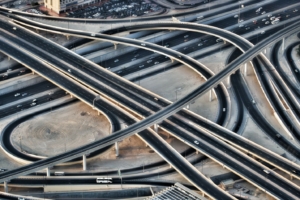
Long-distance travel damages the environment and harms wellbeing. (Michael Theis, CC BY 2.0 DEED 2.0)
Economies that operate within planetary boundaries are likely to be heavily localized compared to economies today. Planners will need to shift modes of transportation and redesign cities. Businesses will need to shorten supply chains. This is because freight and passenger travel impact the environment extensively. Respecting planetary boundaries requires that we create economies that do not rely heavily on long-distance travel.
To help accomplish this goal, CASSE introduces the Mileage Fee Act (MFA). This bill is designed to assess owners of road vehicles, trains, ships, and aircraft a fee based on distance traveled. By advancing a restructuring of the ties that link people, goods, work, and recreation, the MFA can help build a more sustainable and resilient economy for all.
Long Distance, Great Impact
Americans and their goods travel great distances. At the time of the Bureau of Transportation Statistic’s most recent long-distance travel survey in 2001, trips of 50 or more miles (or 100+ miles round trip) comprised about 30 percent of all passenger travel in the USA. This amounted to about 2.6 billion long-distance trips per year, or 7.2 million per day, overwhelmingly made by automobile. And since 2001 global estimates of long-distance travel have trended upward.
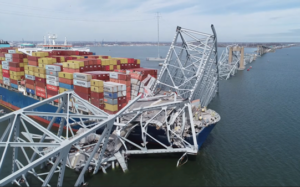
Economies that depend on long-distance trade are fragile and ecologically vulnerable. (Dunk, Flickr)
Freight travel shows similar growth: More than a quarter of all goods by weight, and nearly 45 percent by market value, traveled more than 250 miles in the USA.
Long-distance travel has a number of outsized impacts. A study of food transport in the EU found that 68 percent of freight carbon emissions came from long-distance transport. Only 26 percent were from shorter hauls. The infrastructure built to accommodate motorized vehicles, whether for long-distance travel or commuting purposes, destroys habitats and uses valuable natural resources. And sprawling cities built around motor vehicles have disproportionately high impacts on biodiversity, water pollution, and the climate.
These are just the environmental damages. Sprawling cities also widen equity gaps related to lack of accessibility. Meanwhile, sourcing products from long distances impairs the economic resilience of communities. And non-local products, particularly food, are less healthy and less likely to build community than those grown and consumed locally.
On the other hand, a locally based economy has many benefits, including increased economic strength and social connection. Strategies for creating such localization include encouraging use of alternative transportation such as bicycles and public transit, and orienting urban planning to increase density. But government leaders can also use fiscal policy to create more localization in our economy. That’s where the Mileage Fee Act comes in.
Closing the Distance
The USA already levies taxes on transportation. The Airport & Airway Trust Fund is financed in part through a tax on passenger tickets and jet fuels. We have excise taxes on new freight trucks, diesel fuel, and heavy vehicles. There’s a gas and diesel tax for automobile drivers (although it hasn’t been raised since 1993). Even railroads have a diesel fuel tax of 0.1 cent per gallon.

Locally grown food is often healthier and more sustainable than food imported from long distances. (Carol M. Highsmith, CCO 1.0 DEED)
But fuel taxes are not protecting the environment. They are not high enough to fund environmental remediation, nor do they cover the costs of other externalities of road travel like pavement damage, accidents, and congestion. In 2000, for example, the Federal Highway Administration (FHWA) found that heavy commercial trucks generally pay less in federal taxes than the cost of the road damage they cause. And as more automobiles go electric, fuel-based taxes will be less effective in curbing automobile travel (and in funding transportation needs via the Highway Trust Fund).
For these reasons, many countries are turning to a “Vehicle Miles Tax (VMT)” as a supplement or alternative to fuel taxes. Such a levy could ensure that drivers of electric vehicles pay their fair share of transportation infrastructure costs. In addition, it would ensure that people who drive more pay their fair share of costs. (These drivers tend to be wealthier than those who travel less.) And it can offset falling fuel tax revenues.
Numerous cities, regions, and countries have implemented VMTs, including New Zealand, Singapore, Germany, Austria, and Poland. And U.S. states increasingly use them. Oregon, Kentucky, Washington, Minnesota, New York, and New Mexico have implemented a version of a VMT.
Moreover, VMTs are flexible enough to capture additional transportation externalities. Rates can vary by vehicle weight, fuel type, and transport mode (road, air, or rail). They can be adjusted by time of day to prevent road congestion. And governments can use funds raised by the charge to reduce other taxes or fund public transportation or other amenities.
The Mileage Fee Act
We designed the Mileage Fee Act to reduce travel distance in the USA. The purpose is to promote environmental health, social equity, and economic efficiency. The Department of the Treasury will implement the fee collection program.
Section 4 of the Act describes the target and structure of the fees. It directs the Secretary of Transportation to impose fees on vehicle owners on a per-mile basis, differentiated by mode of transport. The fee will apply to travel greater than 50 miles per one-way trip. The Secretary will assess owners of aircraft 20 cents per excess mile; owners of ships, 15 cents; heavy trucks, 10 cents; railroad cars, 5 cents; and passenger vehicles, 2.5 cents per excess mile. It will also assess owners of uncrewed vehicles such as drones.
Section 5 establishes provisions for recording and reporting vehicle miles traveled. Transportation analysts record travel distance using a variety of methods that require equipment ranging from vehicle odometers to GPS-based technology. The Act charges the Secretary of Transportation with identifying an accurate recording method that protects the privacy of owners and is immune from tampering.
Sections 6 and 7 describe how the revenue raised by this Act will be allocated. Half of all revenue will go to a new Passenger Rail Trust Fund for the purpose of improving public rail facilities, modernizing the rail fleet, and reducing energy consumption. The other half will be allocated to the existing Highway Trust Fund, which helps finance both road and mass transit construction. Because the revenue raised by this Act goes into these specific funds rather than general public budgets, we call the legislation the “Mileage Fee Act” rather than the “Mileage Tax Act.”

Mileage fees would promote local enterprises. (Lee Edwin Coursey, CC BY 2.0 DEED)
Section 8 establishes provisions for the Secretary to adjust mileage fees in the years following its adoption, based on inflation, equity, and efficiency.
Sections 9 and 10 address enforcement. They empower the Attorney General to bring civil actions to enforce compliance with this Act. Any person who violates the Act or makes false statements will be subject to the penalties identified in the IRS Handbook.
We designed the MFA as a stand-alone bill and a component of the larger Steady State Economy Act. The MFA will not, by itself, end harmful forms of transportation or unsustainable supply chains. But it will help shorten the distance to establishing local, equitable, and thriving economies that operate within planetary boundaries.
Daniel Wortel-London is a CASSE Policy Specialist focused on steady-state policy development.

The post Introducing the Mileage Fee Act appeared first on Center for the Advancement of the Steady State Economy.
The Women Bus Drivers Overcoming Stereotypes in Bogotá
When Paola Perez shifts into gear and puts her foot down on the accelerator, the lime-green bus zips forward with an almost-silent whoooosh. Neat rows of dozens of identical vehicles are visible on either side through its large rectangular windshield.
“This is a very beautiful place to work,” says Perez, as she steers the bus through the pleasingly symmetrical universe of white lines, smooth gray asphalt and angular metal platforms that house nearly 200 electric charging stations. “It’s new, it’s clean and it all works.”
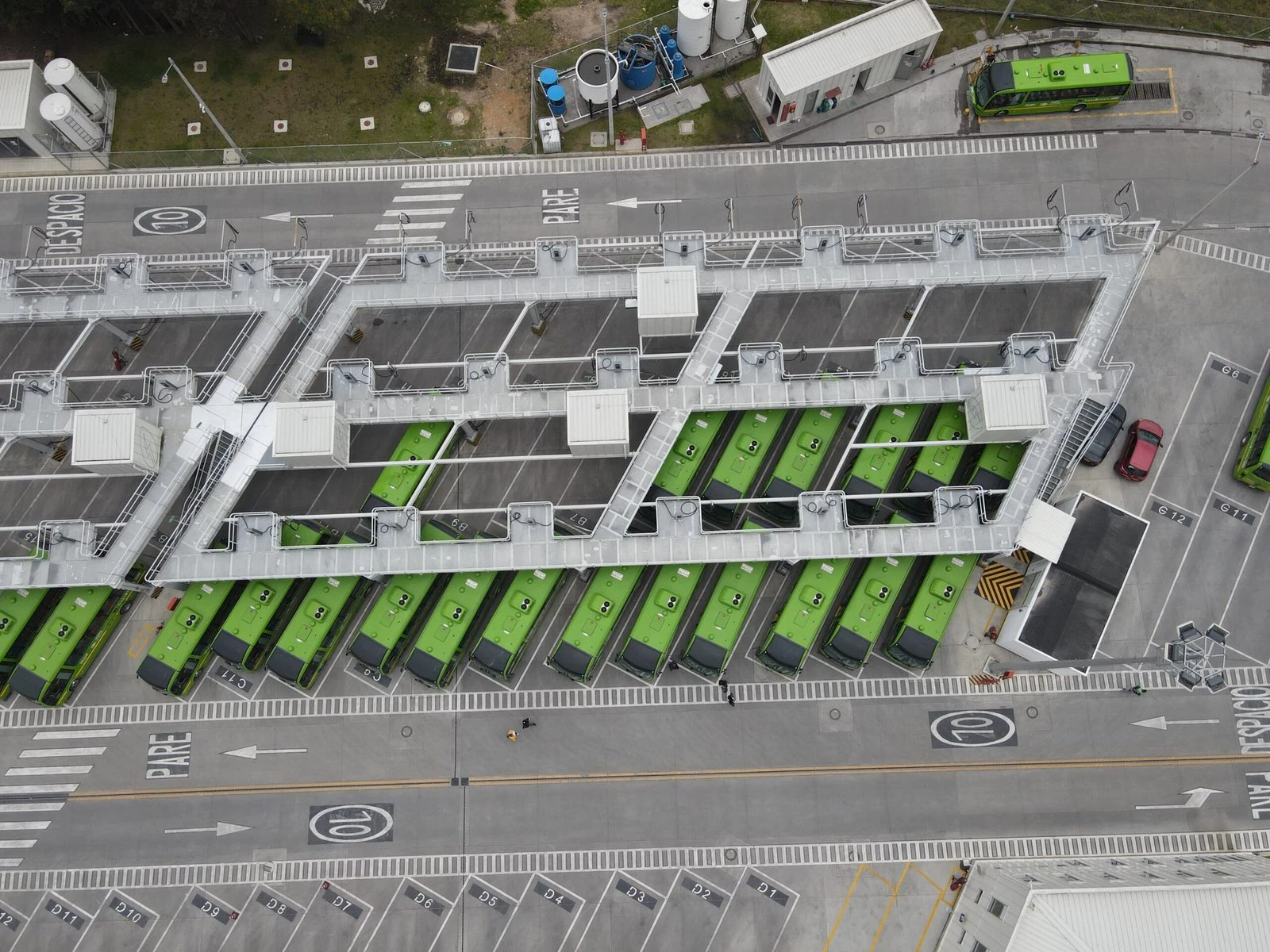 La Rolita’s 195 buses are 100 percent electric. Credit: Peter Yeung
La Rolita’s 195 buses are 100 percent electric. Credit: Peter Yeung
This impressive space in the southwest of Colombia’s capital, Bogotá, which opened in September 2022, is the headquarters of a project taking a rare gendered approach to urban mobility. Nicknamed La Rolita — a diminutive of the word for a person from Bogotá, un rolo or una rola — it is a public transit operator largely driven by women.
“It feels like a sorority,” says Perez, 37, who has been a driver since the start. “There’s a camaraderie. We speak to each other and help each other whenever we can.”
By placing women at the heart of La Rolita, which employs about 300 female drivers and is led by a female director, city authorities are creating a more sustainable, safe, equal and just transport system in the sprawling metropolis of eight million people.
 Paola Perez, who has been driving with La Rolita from the beginning, has found a camaraderie among the women who work there. Credit: Peter Yeung
Paola Perez, who has been driving with La Rolita from the beginning, has found a camaraderie among the women who work there. Credit: Peter Yeung
“This is a masculinized sector that we are working in,” says Carolina Martinez, the organization’s general manager. “But we are beginning to change that. There are many positive and important opportunities for us to benefit from in the long term.”
For one, according to Martinez, women bus drivers have fewer traffic accidents: La Rolita, which is the city’s only public bus operator, has the second-lowest number of injuries due to accidents — 72 in 18 months — when compared with the numerous private bus operators. (Other research backs this up: One study published in 2020 by Belgium’s road traffic institute Vias found that generally women drivers “take fewer risks behind the wheel than men” and “are less involved in serious accidents.”)
The presence of female drivers in public transit also helps female passengers to feel safer in the face of high levels of gender-based violence across the city, adds Martinez. A survey in 2020 found that 84.3 percent of women in Bogotá have experienced sexual harassment while using public transit.
The post The Women Bus Drivers Overcoming Stereotypes in Bogotá appeared first on Reasons to be Cheerful.
Feds Recently Hit Cargo Giant In Baltimore Disaster For Silencing Whistleblowers
The company that chartered the cargo ship that destroyed the Francis Scott Key Bridge in Baltimore was recently sanctioned by regulators for blocking its employees from directly reporting safety concerns to the U.S. Coast Guard — in violation of a seaman whistleblower protection law, according to regulatory filings reviewed by The Lever.
Eight months before a Maersk Line Limited-chartered cargo ship crashed into the Baltimore bridge, likely killing six people and injuring others, the Labor Department sanctioned the shipping conglomerate for retaliating against an employee who reported unsafe working conditions aboard a Maersk-operated boat. In its order, the department found that Maersk had “a policy that requires employees to first report their concerns to [Maersk]... prior to reporting it to the [Coast Guard] or other authorities.”
This is not a paywall. You can read the full story for free.
Just sign up below for a free subscription to The Lever to get access to this story and much more.
Already have an account? Sign in
Cartoon: The Tesla death trap!
Follow me on Mastodon, Bluesky, Facebook, Instagram, or at my website.
Cartoon: Electric vehicles gone wrong
I appreciate that the new Dodge Charger EV does not have a ten foot-high grille. But it comes with an obnoxious feature called "Fratzonic Chambered Exhaust" which creates fake engine-revving sounds through a system of woofers and speakers and acoustic chambers, with a volume up to 126 decibels. According to the CDC, "loud noise above 120 dB can cause immediate harm to your ears."
Help keep this work sustainable by joining the Sorensen Subscription Service! Also on Patreon.
Can Cities Drive SUVs Off Their Streets?
In early February, Paris took a decisive step to deter visitors from driving enormous cars like SUVs in the city center. Voters approved a measure that would triple parking fees for SUVs and other large vehicles. If Paris City Council approves this measure in May, on-street parking fees for heavy vehicles will be as high as $240 for six hours, as opposed to $80 for regular cars. (Exceptions will be made for Paris residents who park in their own neighborhoods, people who use heavier vehicles because of disabilities, and professional vehicles such as taxis.) Residents of Lyon, the third-largest city in France, will vote on a similar proposal this month, and in Grenoble, residents have already voted to increase parking prices for SUVs who park in city-owned parking structures.
There are several reasons a city like Paris might want to discourage people from driving ginormous vehicles. Not only do SUVs and other large cars guzzle more fuel (and therefore emit more greenhouses gases) than regular cars, but they’re also more lethal to pedestrians and cyclists. New research published by the Virginia-based nonprofit Insurance Institute for Highway Safety showed that trucks, SUVs, and vans with hood heights greater than 40 inches were nearly twice as likely to cause a fatality in crashes with pedestrians than shorter, lighter vehicles. This adds to a growing body of research that shows bigger, heavier vehicles are more lethal in crashes — even to other cars. Children are particularly vulnerable. In New York City, half of the children killed on city streets between 2014 and 2019 were struck by SUVs or other large vehicles; in 2022, that percentage rose to a grisly 80 percent. Finally, heavy vehicles like SUVs, which can weigh over 6,000 pounds (three tons), also take a greater toll on roads.
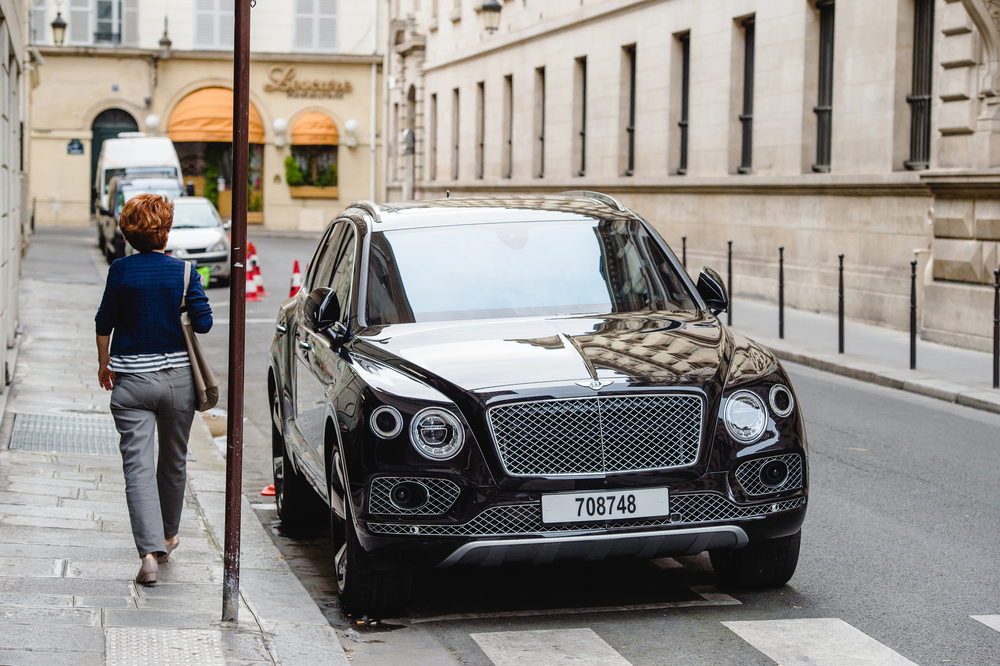 Voters in Paris recently approved a measure to triple parking fees for SUVs. Credit: Hadrian / Shutterstock
Voters in Paris recently approved a measure to triple parking fees for SUVs. Credit: Hadrian / Shutterstock
Following Paris’ example, Germany’s Environmental Agency (BUND) called for higher parking fees on SUVs, and so did the Association of German Cities. (So far, only the city of Tübingen has implemented such a policy.) That said, in seven European countries, the taxes residents pay when buying a combustion-engine car or truck more than double the cost of the vehicle. Those countries are Denmark, Finland, France, Iceland, Turkey, the Netherlands and Norway.
Though he’s unaware of any American city that has introduced a parking reform similar to Paris’s, Henry Grabar, author of Paved Paradise: How Parking Explains the World, thinks a policy like this is far more likely to be adopted in the US than one might expect.
“It’s less about getting rid of on-street parking spaces and more about putting the interests of city residents over those who live outside the city,” Grabar says. “So even if you were a Parisian who drives an SUV this would’ve been an appealing proposal for you, because the more you can dissuade suburbanites from driving into town and using up your parking, the more parking there is available for you.” A decade ago, Donald Shoup, the US’s foremost parking scholar, wrote a paper for Access called “Making Parking Meters Popular” suggesting exactly this policy. One way to make parking meters more palatable to voters, he argues, is to give parking discounts to local residents.
“Resident parking discounts are justified because residents already pay taxes to maintain the streets and municipal garages in their city,” he writes. This policy should also please merchants, according to Shoup, because it’ll give residents new incentives to shop locally. (In that same piece he also floated an idea to give parking discounts to smaller cars that take up less curb space. Though he suggested cities classify license plates by car length, not weight, the idea was the same as the one behind the new Paris ordinance: tax larger, less fuel-efficient vehicles.)
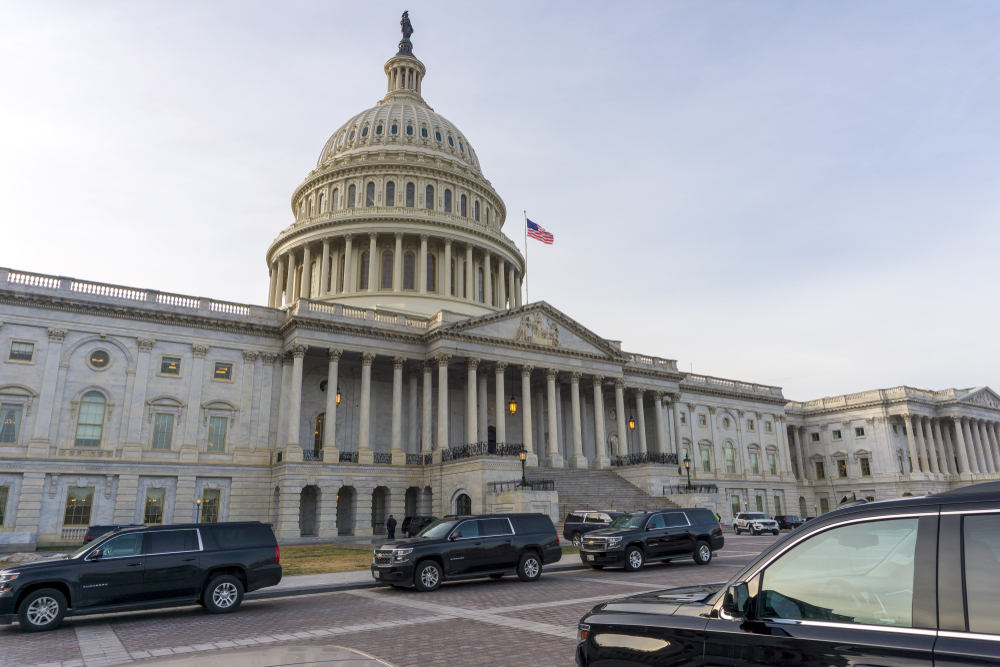 Washington D.C. was the first US city to pass legislation to raise registration fees for larger vehicles. Credit: Erik Cox Photography / Shutterstock
Washington D.C. was the first US city to pass legislation to raise registration fees for larger vehicles. Credit: Erik Cox Photography / Shutterstock
That said, there are a few places in the US that are charging more for the registration of these behemoth vehicles.
Quite a bit more.
In 2022, Washington D.C. became the first city in the US to pass legislation to raise registration fees for larger vehicles. Though the move was part of the District’s broader strategy to combat climate change, Mary M. Cheh, the bill’s lead sponsor on City Council, also frequently spoke about how dangerous heavy vehicles are in pedestrian or bicycle-related accidents. Starting in October 2023, the annual registration fee for a vehicle weighing over 6,000 pounds increased to $500. (Vehicles under 3,500 pounds like the Honda Civic remained at $72 per year to register.) Electric vehicles are discounted to $36 annually, at least for the first two years. After that, an electric vehicle owner will still pay less than the standard registration fee (the deduction is determined by the car’s weight). Here, too, exceptions are made for those whose vehicle is heavier due to the accommodation of a disability. The higher fees are expected to bring in $9 million in fiscal year 2024, which will be earmarked for improving road safety around schools.
New York State is considering similar legislation. State senator Andrew Gounardes is the lead sponsor of a bill that would incrementally increase registration fees on heavier vehicles so that by 2030, the owner of a Ford Explorer (curb weight: 4,345 pounds) would have to pay $680 every two years. In this proposed legislation, even electric vehicles that weigh over 5,000 pounds would be charged the higher fees, since — even though they don’t emit carbon — they are still as likely to kill pedestrians as their gas-powered brethren. (Smaller EVs would be eligible for a $1,000 credit.)
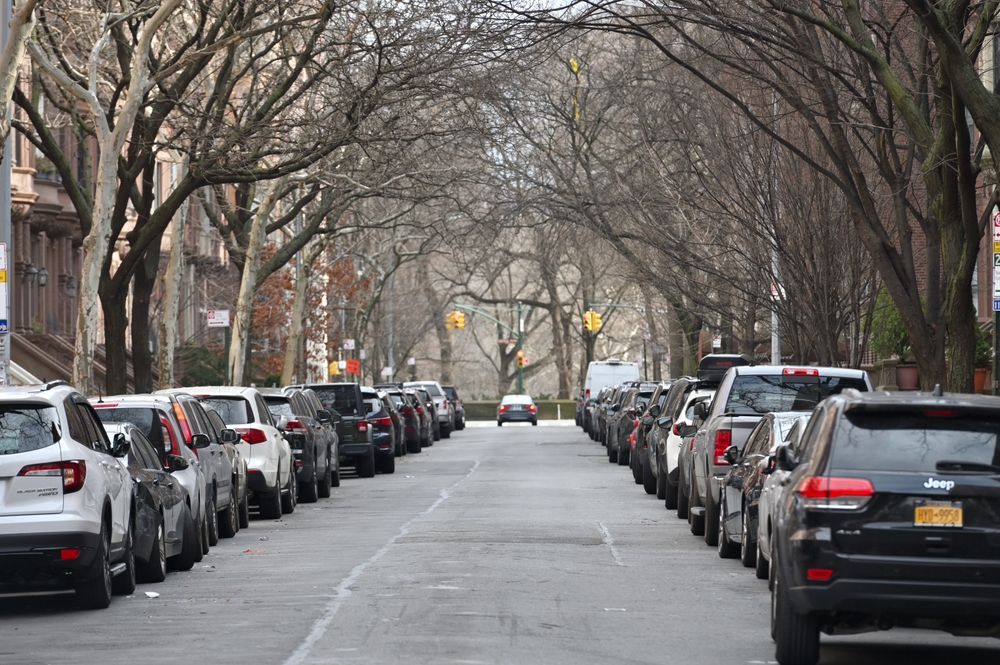 Proposed legislation in New York would incrementally increase registration fees on heavier vehicles. Credit: astudio / Shutterstock
Proposed legislation in New York would incrementally increase registration fees on heavier vehicles. Credit: astudio / Shutterstock
Grabar thinks it’s unlikely that something like a higher parking fee — even one that’s three times higher — would disincentivize suburbanites from buying SUVs. After all, what’s $240 every so often when you’ve spent $50,000 on your car?
“But it could potentially change peoples’ day-to-day decision-making about whether to drive their SUV to a particular location,” Grabar says. “There is a significant externality to having somebody in a giant car driving around your downtown. Chiefly, that externality comes in the form of pedestrian and bicycle fatalities.” So to Grabar, the rationale should be more, “‘You want to drive into our congested, pedestrian-friendly city center? Well, that’s fine but you’re going to have to pay for it.’ And if that payment gets you to think twice about your choice to drive it downtown then that’s exactly the goal.”
Crushed by negative news?
Sign up for the Reasons to be Cheerful newsletter.
[contact-form-7]
Tony Jordan, the founder and president of the Parking Reform Network in Portland, Oregon, says that the new Paris law is good and necessary policy. “In the United States, we’re trying to get there but we’re so far behind,” Jordan says. He thinks that there’s great opportunity for progress at the state level, though, charging a higher vehicle registration fee for heavier cars the way New York is proposing. Some states, including Oregon, are realizing that as more residents switch to electric cars, the traditional funding source for road maintenance — gas taxes — is disappearing. As a result, Oregon is considering vehicle-miles-traveled (VMT) fees — and this could be calibrated to include vehicle size.
In New York, the proposed bill is focusing solely on vehicular violence, but Jordan thinks that’s a mistake. “It’s harder, for sure, to build campaigns around multiple issues, but there are many stakeholders whose issues are impacted by very large personal vehicles,” says Jordan. “I believe there’s a lot of power in coalition-building. And coalition-building pays dividends beyond any particular campaign.”
The post Can Cities Drive SUVs Off Their Streets? appeared first on Reasons to be Cheerful.
The Koch Network Is Killing Rail Safety
One year after a toxic train derailment in East Palestine, Ohio, inspired bipartisan legislation that would have made the nation’s railways safer for everyone, the bill has been all but killed — largely thanks to a familiar conservative foe: the Koch network.
Koch Industries, the parent company of various petrochemical subsidiaries run for decades by Charles Koch and his now-deceased brother David, spent nearly $8 million in the past year lobbying on the legislation and other issues, as well as donated $1.4 million to Republican lawmakers who helped stall the legislation. The effort was part of nearly $200 million the conglomerate has spent in the past decade to persuade lawmakers and regulators to block railway safety legislation and other measures — including reforms that could have helped avoid the East Palestine disaster.
These amounts don’t include millions more spent by the extended Koch network, a shadowy web of libertarian think tanks, foundations, and advocacy groups founded by the Koch brothers to stop government efforts to boost health care, combat climate change, and improve the common good.
In comparison, the railway interests that would have to bear the direct costs of safety reforms spent $4.4 million lobbying on the legislation and other matters, and $110,000 on related political donations in 2023.
The Koch network’s opposition to rail safety isn’t just an outgrowth of its anti-government ideology. Part of the cost of new regulations would likely be passed on to Koch Industries and other hazardous material producers in the form of higher rail freight costs for chemicals and other manufacturing materials used for products like kitchenware, clothing, airbags, and petroleum-based products. The costs to clean up hazardous derailments, on the other hand, fall on the railroad companies — which leaves less incentives for Koch Industries and other chemical producers to advocate for regulations that could reduce accidents.

Wear Your Support
Check out The Lever’s merch. Every purchase supports holding the powerful accountable through the tireless independent journalism that corporate media will not do.
On March 1, 2023, less than a month after a Norfolk Southern freight train derailed in East Palestine, releasing more than a million pounds of toxic chemicals into the environment, Sens. Sherrod Brown (D-Ohio) and J.D. Vance (R-Ohio) introduced the Railway Safety Act in the Senate. The bill, cosponsored by a group of bipartisan Senators, aimed to require at least two operators on trains hauling toxic chemicals, increased inspections, heavier fines for rulebreakers, and a phaseout of 1960s-era tank cars that haul hazardous materials.
The bill offers the first major safety reforms for the rail industry since 2008, when Congress passed legislation requiring updated technology that helps prevent train collisions and automatically reduces train speed to prevent derailments.
But the Koch network and its web of conservative operatives launched an all-out assault to stop the new rail safety bill. Along with spending millions in lobbying and donations, the groups have mounted a PR blitz.
In July, the Koch-backed Competitive Enterprise Institute, a conservative think tank, sent a letter to federal lawmakers urging them to oppose the Senate version of bill, saying in part that the legislation “includes far too many prescriptive policies, unduly favors organized labor, and would unduly empower unelected bureaucrats.”
At least five other Koch-backed groups, including Americans for Prosperity, the Rio Grande Foundation, 60 Plus Association, the American Consumer Institute, and Americans for Limited Government also signed onto the Competitive Enterprise Institute letter. Last year alone, Koch Industries donated $25 million to Americans for Prosperity, a libertarian group founded by Charles and David Koch.
Then, on the one-year anniversary of the East Palestine derailment, the Competitive Enterprise Institute declared in an opinion piece for The Hill that to honor the accident, Congress should not pass rail safety legislation and should instead let the industry regulate itself.
“Instead of trying to prevent the last accident, a better way to approach the problem would be to set safety targets and allow railroads to develop the best ways to meet them,” wrote Iain Murray, a senior fellow at the Institute.
Such demands have been met as key legislators who have raked in tens of thousands of dollars in campaign donations from Koch Industries and other groups have watered down the legislation — including removing the tank car upgrade provision — and blocked all movement on the bill.
A House version of the Railway Safety Act was introduced soon after the Senate version and both efforts have bipartisan and public support — which makes the bills’ lack of progress even more frustrating, said Rep. Chris Deluzio (D-Penn.), co-author of the House bill and whose district borders East Palestine.
“We can’t get this thing on the floor or even moving through committee,” DeLuzio told The Lever. “I think the problem here is Republican House leadership won’t move the bill, and I suspect that’s because of the strong lobbying by the rail industry and others against it.”
Koch Industries did not respond to a request for comment.
The Deregulation Squad
Koch Industries is the massive parent company for various subsidiaries that sell everything from beef and medical technology to asphalt and fertilizers to petrochemicals and oil. Koch Industries’ products are crucial in making many common consumer items — including Brawnie and Dixie kitchen products, smart phones, electric cars, and various chemicals found in common fertilizers.
A key ingredient in many fertilizers is ammonia, a corrosive chemical that can explode if ignited, and Koch Fertilizer claims to produce 10 million metric tons — roughly 2.6 billion gallons — of ammonia annually.
Regulations require large quantities of ammonia and other dangerous chemicals to be transported by rail lines to prevent disasters in high-population areas. This means Koch companies rely on the rail industry to ship their highly toxic products across the country in order for them to be used or refined elsewhere. Those lines often run through rural or economically depressed areas.
To keep rail freight costs down, Koch Industries has been fighting railway safety legislation for more than a decade. The corporation and others have repeatedly asked regulators to conduct further studies on how new regulations may affect the industry and pleaded for delayed timelines, a Lever review of comments submitted to regulators has revealed.

Go Deeper Into The Story.
The Lever has been at the forefront of reporting on major transportation issues, including the 2023 East Palestine disaster.
Read More Of Our East Palestine Coverage
The conglomerate often works hand in hand with rail interests and other industry groups. That includes the Association of American Railroads, a major lobbying group representing the largest rail companies, which has given safety awards to Koch companies and has Koch Industries representatives sit on internal committees. It also includes the Fertilizer Institute, a lobbying group representing the fertilizer industry that counts Koch Industries as a member,
In particular, Koch Industries and related interests have opposed regulations to strengthen rules governing tank cars — rail cars used to ship flammable liquids, compressed gasses, and other hazardous materials.
In 2006, the Federal Railroad Administration proposed a rule that would have forced railroads to get rid of flimsy 1960s-era tank cars and use thicker, modern versions to avoid leaks and spills. In a comment to federal regulators, the Koch Nitrogen Company claimed the rule change would have a “significant” economic impact on the company and that using the new tank cars for ammonia would result in a “single-purpose piece of equipment” and disrupt the market.
The rule stalled, but after a series of fiery incidents in 2013 — including one in Canada that left 47 people dead — federal regulators proposed a new rule requiring railroad companies to upgrade their tank cars used in shipping hazardous materials. The following year, regulators promulgated a similar rule proposal that singled out tank cars hauling hazardous and flammable contents and required all out-of-compliance tank cars to be phased out by October 2020.
During that time, Koch Industries spent more than $24.5 million lobbying on tank car safety issues and other concerns, 2014 and 2015 lobbying disclosures show. The Association of American Railroads spent another $13 million lobbying on tank cars and other issues facing the rail industry during the same period.
The Association of American Railroads and the American Shortline Railroad Association, which represents smaller, regional railroad companies, ostensibly supported the 2013 rule for upgraded tank cars, but urged regulators to slow the timeline after considering the manufacturing and retrofitting work needed to comply with the rule change.
The Fertilizer Institute concurred, telling regulators that they should “conduct a thorough risk-benefit analysis to ensure that the risks of certain products warrant design changes specified.”
And regarding the 2014 rule proposal, the Fertilizer Institute told regulators that they were concerned that the proposed definition of a “high-hazard flammable train” would extend to tank cars not carrying potentially dangerous chemicals and “have severe negative consequences for all other traffic that depends upon a fluid national rail network.”
The tank car rules were finalized in 2015 and required that railroads fully implement the new tank cars carrying dangerous chemicals by May 2025. However, Congressional Republicans slipped a provision into a 2015 funding bill extending the deadline to 2029 — and former President Barack Obama signed the bill into law.
The tank car issue continued to be an area of concern for industry stakeholders. Koch Industries spent nearly $54 million lobbying on tank cars and other issues between 2014 to 2019. The Association of American Railroads spent nearly $27 million lobbying on tank cars and other issues during the same time period.
The rail industry also lobbied to obscure the definition of high-hazard flammable trains and were able to exempt vinyl chloride, the volatile and carcinogenic chemical released in East Palestine. Because of this lobbying, the East Palestine train was not regulated as a high-hazard flammable train even though during a controlled release, its contents exploded and sent 100-foot flames into the sky.
“Unimaginable Authority”
Most recently, Koch Industries spent nearly $8 million lobbying on the Railway Safety Act and other issues in 2023, and its anti-regulation efforts extend beyond official company lobbying.
The Association of American Railroads spent $4.4 million lobbying Congress and regulators on the Railway Safety Act and other issues in 2023. The group supports the Railway Safety Act in some aspects, but opposes key provisions that would increase the number of workers on trains and enhance other safety measures.
“Challenges remain with certain provisions, including those that mandate crew staffing models, expand hazmat transportation operating requirements, micromanage detector networks, and unnecessarily broaden manual inspections,” the Association of American Railroads wrote in a press release. “If stakeholders’ goal is to drive continuous improvement in rail safety, the industry must be able to continue innovating just as it did decades ago to develop today’s wayside detectors.”
The Fertilizer Institute spent $1.7 million lobbying on rail safety legislation and other issues in 2023.
The wider Koch network has also pushed back on recent attempts to regulate the rail industry. Just a month after the East Palestine disaster, FreedomWorks — a conservative advocacy group founded by Charles and David Koch — urged lawmakers to oppose the Railway Safety Act, saying the bill would give the Transportation Department “unimaginable authority.”
“Introduced following the horrible accident in East Palestine, Ohio, the legislation offers a slew of significant new regulations that would do little to improve safety while creating gross inefficiencies for thousands of businesses,” FreedomWorks wrote in a letter to Congress. FreedomWorks spent $30,000 in 2023 lobbying on the Railway Safety Act and other issues.
Koch-Backed Politicians
Koch Industries’ efforts to block railway safety legislation also include direct campaign donations to Congressmembers sitting on key committees overseeing railway legislation and funding challengers against pro-railway safety politicians.
The top five Republicans on the House subcommittee overseeing railway regulations — Reps. Troy Nehls (Texas), Brian Babin (Texas), David Rouzer (N.C.), Mike Bost (Ill.), and Doug LaMalfa (Calif.) — have received more than $85,000 in total campaign donations from Koch Industries, the Association of American Railroads, the American Shortline Railroad Association, and the Fertilizer Institute in the past three election cycles.
Similarly, the top five Republicans on the Senate committee overseeing the rail industry — Sens. Ted Cruz (Texas), John Thune (S.D.), Roger Wicker (Miss.), Deb Fischer (Neb.), and Jerry Moran (Kan.) — have received more than $66,000 in campaign donations from these same industry groups since 2020.
The House subcommittee has blocked any discussion on the Railway Safety Act, and the Senate committee, chaired by Sen. Maria Cantwell (D-Wash.), weakened the bill by delaying a deadline for stronger tank cars.
Republican leadership has also received tens of thousands of dollars in campaign donations from these groups. Senate Minority Leader Mitch McConnell (Ky.) has received $39,000 from Koch Industries, the Fertilizer Institute, and the American Railroad Association since 2020. House Speaker Mike Johnson (La.), who can bring bills to a vote in the House of Representatives, has received $39,000 from Koch Industries during that same time frame.
Koch Industries also gave $500,000 to the Senate Leadership Fund, which is used to elect Republican Senators, and gave $750,000 to the Congressional Leadership Fund, which is used to elect Republicans in the House.
Deluzio recently urged Johnson to bring the Railway Safety Act he co-authored to a floor vote and support its passage. His pleas have so far gone unanswered — and now he’s being targeted by the Koch network.
In his 2024 efforts for re-election, Deluzio is facing a potential Koch-backed challenger who is running in the GOP primary — and Democratic leadership has labeled his seat as “vulnerable.”
“One of the first endorsements against me was Americans for Prosperity, who’s literally lobbying against the Railway Safety Act,” said Deluzio.“I think it sends a pretty strong signal to our constituents, that there are folks in Washington willing to carry water for big corporations at the expense of all of us.”

Learn All Our Investigative Tricks
Score a copy of our Citizens’ Guide to Following the Money and Holding the Powerful Accountable, free with a paid subscription. The e-book gives you all the tools and tricks our reporting team uses to scrutinize power.
“Too Little, Too Late”
The Railway Safety Act would be a good first step if it ever comes up for a vote, but some advocates say more extensive reforms are needed.
“[The bill is] really not enough,” said Matt Weaver, an organizer with Railroad Workers United,. “It’s been muddied up by lobbyists.”
Weaver believes legislation should mandate two-man crews, better signals at railroad crossings for maintenance workers working on the tracks, and wheel-bearing sensors that alert onboard operators of high temperatures and could have helped mitigate the East Palestine disaster
On February 16, President Joe Biden made his first-ever trip to East Palestine, where he called the derailment “an act of greed that was 100 percent preventable” and urged the passage of the Railway Safety Act.
But Weaver says amid ongoing market consolidation in the rail industry and “precision scheduled railroading” cost-cutting efforts that have led to longer trains and smaller crews, a photo op and inspiring speech isn’t going to be enough to improve rail safety. There have already been three railroad worker deaths this year that Weaver believes could have been prevented with stricter regulations.
“Seeing Biden go to East Palestine was a good thing, but boy it’s too little, too late,” Weaver said. “He demanded Congress pass the [Railway Safety Act], but there is so much other stuff going on. The industry has so much power and they have great monetary influence on politicians.”
Editor’s note: This story has been updated to clarify that Koch Industries lobbied on the Rail Safety Act and other issues in 2023.
McDonalds, Starbucks, others admit Gaza boycott hitting profits
Firms admit losses or even cut ties with Israel
The chief executives of food chains McDonalds and Starbucks have admitted that the global boycott of their stores and products because of the firms’ support for Israel is hitting their profits. McDonalds in Israel provided free meals to Israeli soldiers participating in Israel’s mass slaughter of Palestinian civilians, while Starbucks has sued a union representing some Starbucks workers – the firm has engaged in union-busting efforts – for a post on the union’s social media account expressing solidarity with Palestinians in Gaza.
Other firms have suffered similarly and have even cut ties with Israel because of widespread grassroots anger over the genocide in Gaza. Swiss-based shipping firm Kuehne & Nagel has ceased transporting materials for Israeli weapons firm Elbit Systems and Japanese giant Itochu has announced it will end all collaboration with the same Israeli firm by the end of this month, citing the International Court of Justice’s damning findings against Israel last month in the case brought by South Africa.
January also saw controversy in Ireland after Dublin airport closed its Starbucks but continued to sell the firm’s products under a different brand.
The longstanding ‘boycott, divestment and sanctions’ (BDS) campaign of peaceful resistance to Israel’s apartheid and illegal occupation rattles Israel to such an extent that it set up a specific government department to combat and discredit it. Now, with the Houthi blockade of Israel-bound shipping hitting Israel’s economy, BDS is biting even deeper.
SKWAWKBOX needs your help. The site is provided free of charge but depends on the support of its readers to be viable. If you’d like to help it keep revealing the news as it is and not what the Establishment wants you to hear – and can afford to without hardship – please click here to arrange a one-off or modest monthly donation via PayPal or here to set up a monthly donation via GoCardless (SKWAWKBOX will contact you to confirm the GoCardless amount). Thanks for your solidarity so SKWAWKBOX can keep doing its job.
If you wish to republish this post for non-commercial use, you are welcome to do so – see here for more.

